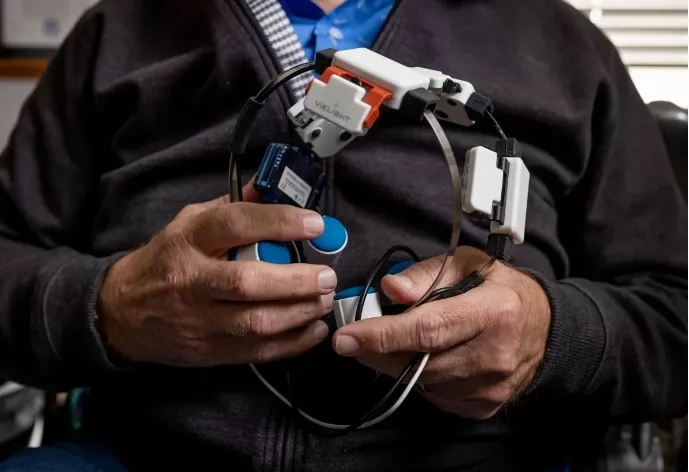
Photo of the LED light headset used in the University of Utah study.
Transcranial LED light therapy, sometimes called photobiomodulation, is one of the safe, alternative therapies the BART Foundation believes may help brain injury survivors. The BART Foundation aims to promote better outcomes for TBI/ABI survivors by answering three questions – which alternative therapies are likely to work, where can they be found, and how can they be afforded? One of the ways we fulfill our mission is by carefully watching global research and clinical trial outcomes and sharing that information, in user-friendly language, with the TBI/ABI community.
We’d like to share this recent story from Deseret News written by Lee Benson about the positive outcomes of a recent University of Utah study involving TBI symptoms and transcranial photobiomodulation (also known as infrared light therapy). In this article, Benson explores the symptoms experienced by the 49 study volunteers and the outcomes they achieved after receiving treatment. Those in the study were former college football players, soccer players, hockey players, and women who had experienced domestic abuse. All participants had a history of debilitating mood swings and diminished cognitive capability.
The great news? Without exception, “significant improvement” was measured for the study participants in every category. Temper outbursts, impulsiveness, forgetfulness, and anxiety have dissipated to a large degree. To those conducting the study at the University of Utah, and members of the TBI/ABI community, the results are encouraging, to say the least.
For those wanting more information about this emerging approach to brain healing, we’d like to share this 30-minute video presentation by Margaret Naeser Ph.D. Dr. Naeser is affiliated with the Boston VA Medical Center and is a Research Professor of Neurology at Boston University’s School of Medicine. Since 2009, she has studied the effect of red/near-infrared (NIR) light-emitting diodes (LED) placed over the scalp/brain to treat sequelae of traumatic brain injury (TBI), PTSD, stroke/Aphasia, Dementia, Gulf War Illness, and most recently, retired, Pro-Football players possibly developing chronic traumatic encephalopathy (CTE). We have another video talk featuring Dr. Naeser on our Media page that is also worth watching.
